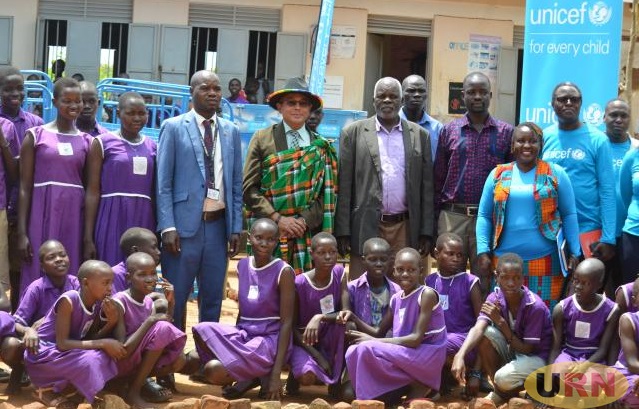
Moroto, Uganda | THE INDEPENDENT | The enrollment in the primary schools across the Karamoja sub-region has tremendously improved, thanks to the Irish Embassy and UNICEF.
On Wednesday (23rd July), H.E. Kevin Colgan, the Outgoing Ireland ambassador, was on his last tour in the Karamoja sub-region. Colgan commissioned a classroom block in Kasimeri Primary School in Moroto district.
The facility was constructed with funding from the Embassy of Ireland through UNICEF, reducing crowding and creating a conducive learning environment for the children.
Other primary schools which benefited from the classroom block project include Oreta Primary in Abim district, Lorukumo Primary school in Nabilatuk district, Katikit Primary school in Amudat and Karenga Boys Primary school in Karenga district.
They also donated 125 double-decker beds and 10 boxes to the repatriated children of Lokodiokodio primary school in Napak district.
With the support from the Embassy of Ireland from 2016 to 2025, they have been able to achieve tangible results for children in the Karamoja sub-region.
More than 260,000 children, both boys and girls, in primary schools have benefited from the program that has improved the learning outcomes. 368 primary schools have also been supported to improve primary leaving examinations, with the current pass rate in the region of 92.3 per cent as compared to the national average of 91.2 percent in 2024.
They also supported 32 secondary schools to improve pedagogical skills in a bridge curriculum interpretation and application.
Dr Robin Nandy, the UNICEF Country Representative, recalled that when their program started in 2016, almost 88 percent of school children either dropped out of formal education or repeated classes and did not complete their primary education.
Nandy attributed the common issues of low enrollment of school-age children, high pupil-teacher ratios, high teacher absenteeism, inadequate supply of qualified teachers and learning facilities.
He noted that there was limited parental and community interest and participation, violence and abuse of pupils and students at school was prevalent and negative gender and social norms prevented girls from completing primary education.
Nandy observed that, through the implementation of their education programme over the last few years, they have witnessed improved enrolment, completion and learning outcomes as highlighted in the results achieved
Nandy noted that they have seen reduced gender disparities in the education sector as well as increased awareness within families and communities of the importance of investing in the education of both girls and boys.
He said that the provision of additional facilities for the schools in the region will provide a firm foundation for learners in an improved learning environment.
Nandy lauded the education ministry for the progress made in ensuring opportunities for early childhood education for children through the development and implementation of the Early Child Care and Education (ECCE) policy. He urged the government to ensure that funding is made available to fully roll out the policy.
Colgan said that he was so grateful to see the positive results of their work, which they have been doing for the last four years in the Karamoja sub-region.
Colgan said that he is grateful to see many children in the schools, as it indicates the bright future of Ugandans. He said that he was impressed by the huge number of children attending schools, which was not to be in previous years.
Musa Birungi, the Senior Education Officer in charge of Basic Education at the Ministry of Education, applauded the Embassy of Ireland for the continued support in promoting quality education in the region.
Birungi noted that since the reopening of schools after the COVID-19 lockdown, enrollment in the lower classes shot up, and the schools lacked space to accommodate all the learners.
The teachers, while bidding a farewell to the Ambassador, recognised the solid partnership with education partners that have done impactful work in transforming education in the region.
Simon Peter Kodet, the deputy head teacher of Lokodiokodio Primary School, said that the interventions by various partners enabled them to attract a total enrollment of 916 learners in this academic year.
Kodet said that the partners supported the school with feeding programmes, scholastic and play materials, which have created a conducive environment for the learners, especially the girl child.
Samuel Ewangu, the head teacher of Kasimeri primary school, said that the enrolment has been improving progressively from 2022 when they registered 1795, it was later added in 2023 with 1859, and in 2024 had 1931.
Ewangu revealed that they currently have a total enrollment of 2117 against 47 teachers, with 9 housing units for teachers. He raised a concern about the shortage of teachers’ accommodation, which has often caused discomfort among the teachers.
Ewangu noted that the school is grappling with the infrastructure and they are struggling to accommodate the high enrolment of learners in the 16 classrooms. He observed that instead of a ratio of 53 pupils in the class, they have a minimum of 151 in the class, and the congestion affects the learning process.
Robert Owili Abia, the Napak deputy chief administrative officer, noted that the intervention by UNICEF has helped to improve the enrollment of learners, and this is yielding more results in education.
Abia cited that schools like Loodoi Primary School, which used to have an enrollment of 400 pupils, have drastically shot up to 1200 learners.
Abia said that they are committed as a district to support some of the challenges that the schools may be facing and ensure that education is perfected.
*****
URN
 The Independent Uganda: You get the Truth we Pay the Price
The Independent Uganda: You get the Truth we Pay the Price



